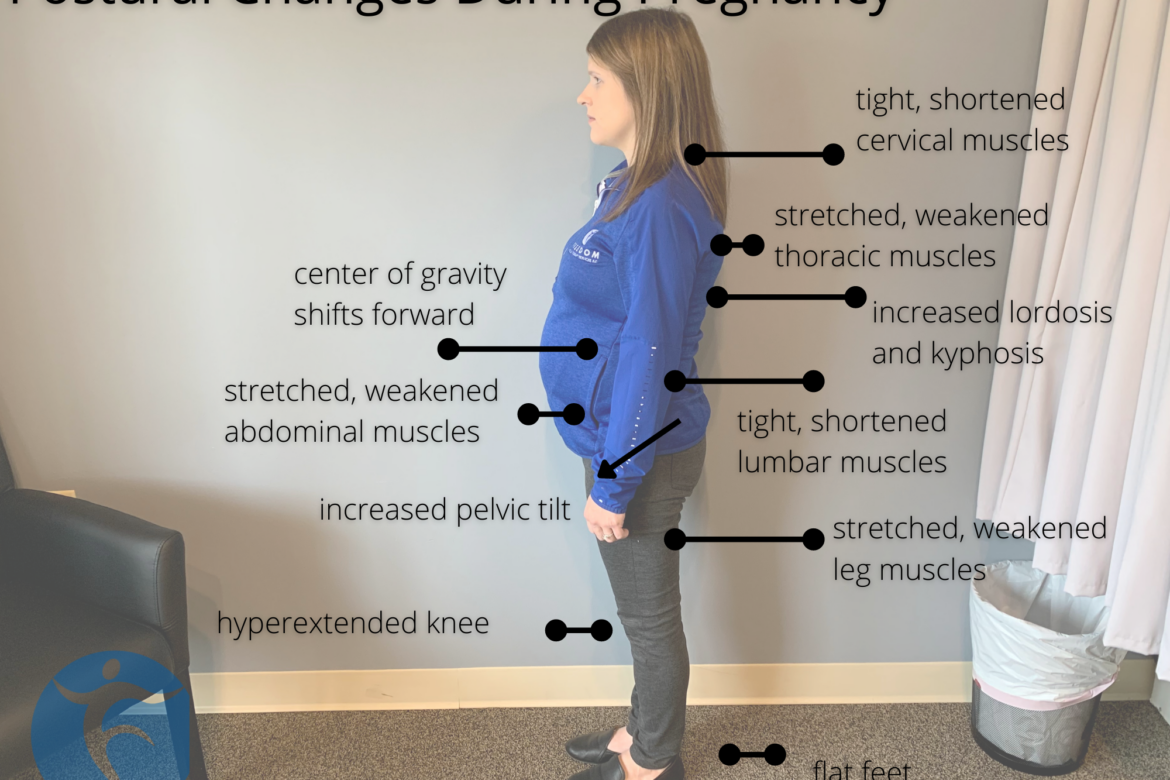Body Changes in Pregnancy
Pregnancy is a time of great change for the mother’s body. Postural changes in pregnancy can happen overnight. As the fetus grows in size, the demands on the mother’s body increase. The center of mass of the mother’s body moves forward. The body needs to compensate to keep standing upright. Above you see how the shifting center of mass causes some muscles to be put on stretch, and some muscles need to work harder to stand upright. This can result in weakness and pain.
Upper Body Changes in Pregnancy
Shifting the head and neck forward can cause neck pain, headaches, jaw pain and tension, pain between the shoulder blades, carpal tunnel syndrome, and arm nerve irritation. Tight muscles in the back of the neck and front of the chest wall can lead to pain. Also, weakness between the shoulder blades can be a driver of these types of pain.
[/et_pb_text][et_pb_text _builder_version=”4.17.4″ _module_preset=”default” hover_enabled=”0″ global_colors_info=”{}” sticky_enabled=”0″]
Postural Changes in the Lower Extremity
The low back muscles are often overactive, needing to work harder to offset the growing fetus and the shifting center of mass. The back often acts as a hinge point. It is common to have increased stress in the low back which causes back pain, pelvic pain, pubic bone pain, and leg nerve pain. This also causes pelvic floor dysfunction and weakened core stability. The pelvis is held in an anterior or posterior pelvic tilt depending on how the mother chooses to compensate.
The knees often hyper-extend to accommodate the forward shifting of the center of mass and the feet begin to flatten. This can cause knee pain, foot pain, or plantar fasciitis in pregnant women.
[/et_pb_text][et_pb_text _builder_version=”4.17.4″ _module_preset=”default” hover_enabled=”0″ global_colors_info=”{}” sticky_enabled=”0″]
What you can do
Gentle exercises for flexibility and stabilization can help reduce the aches and pains commonly associated with postural changes during pregnancy. Working with a women’s health physical therapist can benefit and prevent these postural changes. Whether you choose to begin during pregnancy or during postpartum, it is all beneficial. It is common to have these postural changes persist in the postpartum time unless care is taken to change the developed compensations. Muscles that become tight and weak need flexibility and stability exercises to improve the female’s function and health during and after pregnancy.
Work with our Freedom Women’s Health team to help reduce painful postural changes both during and postpartum.

